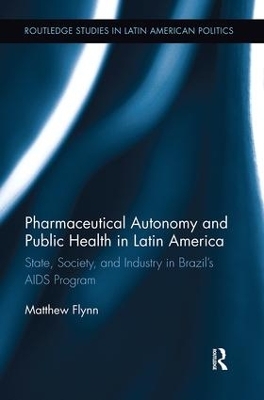
Pharmaceutical Autonomy and Public Health in Latin America
State, Society and Industry in Brazil’s AIDS Program
Seiten
2018
Routledge (Verlag)
978-1-138-31435-1 (ISBN)
Routledge (Verlag)
978-1-138-31435-1 (ISBN)
Through an in-depth case study of Brazil’s successful experience in providing its citizens universal and free access to AIDS medicines, Matthew Flynn identifies the tremendous technological and political obstacles the country faced and the successful strategies Brazilians employed to guarantee access to high-priced medicines.
Brazil has occupied a central role in the access to medicines movement, especially with respect to drugs used to treat those with the human immunodeficiency virus (HIV) that causes the acquired immune deficiency syndrome (AIDS). How and why Brazil succeeded in overcoming powerful political and economic interests, both at home and abroad, to roll-out and sustain treatment represents an intellectual puzzle.
In this book, Matthew Flynn traces the numerous challenges Brazil faced in its efforts to provide essential medicines to all of its citizens. Using dependency theory, state theory, and moral underpinnings of markets, Flynn delves deeper into the salient factors contributing to Brazil’s successes and weaknesses, including control over technology, creation of political alliances, and instrumental use of normative frameworks and effectively explains the ability of countries to fulfill the prescription drug needs of its population versus the interests and operations of the global pharmaceutical industry
Pharmaceutical Autonomy and Public Health in Latin America is one of the only books to provide an in-depth account of the challenges that a developing country, like Brazil, faces to fulfill public health objectives amidst increasing global economic integration and new international trade agreements. Scholars interested in public health issues, HIV/AIDS, and human rights, but also to social scientists interested in Latin America and international political economy will find this an original and thought provoking read.
Brazil has occupied a central role in the access to medicines movement, especially with respect to drugs used to treat those with the human immunodeficiency virus (HIV) that causes the acquired immune deficiency syndrome (AIDS). How and why Brazil succeeded in overcoming powerful political and economic interests, both at home and abroad, to roll-out and sustain treatment represents an intellectual puzzle.
In this book, Matthew Flynn traces the numerous challenges Brazil faced in its efforts to provide essential medicines to all of its citizens. Using dependency theory, state theory, and moral underpinnings of markets, Flynn delves deeper into the salient factors contributing to Brazil’s successes and weaknesses, including control over technology, creation of political alliances, and instrumental use of normative frameworks and effectively explains the ability of countries to fulfill the prescription drug needs of its population versus the interests and operations of the global pharmaceutical industry
Pharmaceutical Autonomy and Public Health in Latin America is one of the only books to provide an in-depth account of the challenges that a developing country, like Brazil, faces to fulfill public health objectives amidst increasing global economic integration and new international trade agreements. Scholars interested in public health issues, HIV/AIDS, and human rights, but also to social scientists interested in Latin America and international political economy will find this an original and thought provoking read.
Matthew B. Flynn is an Assistant Professor of Sociology and International Studies at Georgia Southern University in Statesboro, Georgia. His research focuses on the political economy of pharmaceuticals in contemporary society.
Selected Contents: Introduction: Access to AIDS Medicines, Public Health, and the Brazilian Solution 1. Pharmaceutical Autonomy: Technology, Alliances and Norms 2. Elements of Global Pharmaceutical Power 3. The Brazilian Context: Contradictions between Democracy and Neoliberalism 4. Asserting Antiretroviral Autonomy (1992-2002) 5. Patent Power and the Limits of Treatment Activism Autonomy (2003-2006) 6. Consolidating the Pharmaceutical Alliance (2007-2013) Conclusion
| Erscheinungsdatum | 01.09.2018 |
|---|---|
| Reihe/Serie | Routledge Studies in Latin American Politics |
| Zusatzinfo | 7 Tables, black and white; 6 Line drawings, black and white |
| Verlagsort | London |
| Sprache | englisch |
| Maße | 152 x 229 mm |
| Gewicht | 358 g |
| Themenwelt | Studium ► Querschnittsbereiche ► Infektiologie / Immunologie |
| Sozialwissenschaften ► Ethnologie | |
| Sozialwissenschaften ► Politik / Verwaltung ► Europäische / Internationale Politik | |
| Sozialwissenschaften ► Politik / Verwaltung ► Politische Systeme | |
| Sozialwissenschaften ► Politik / Verwaltung ► Staat / Verwaltung | |
| Sozialwissenschaften ► Soziologie ► Spezielle Soziologien | |
| Wirtschaft ► Volkswirtschaftslehre ► Wirtschaftspolitik | |
| ISBN-10 | 1-138-31435-8 / 1138314358 |
| ISBN-13 | 978-1-138-31435-1 / 9781138314351 |
| Zustand | Neuware |
| Haben Sie eine Frage zum Produkt? |
Mehr entdecken
aus dem Bereich
aus dem Bereich
Buch | Softcover (2023)
Lehmanns Media (Verlag)
CHF 27,90


